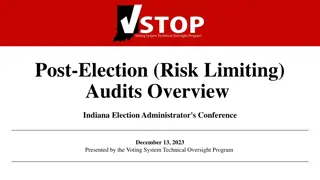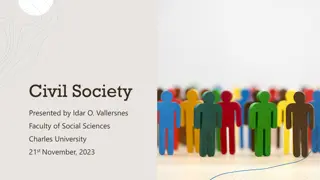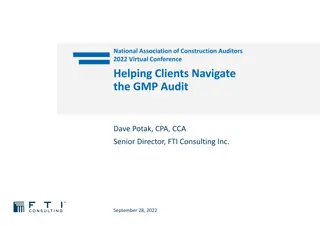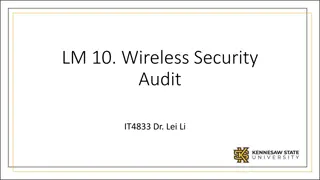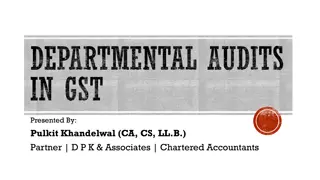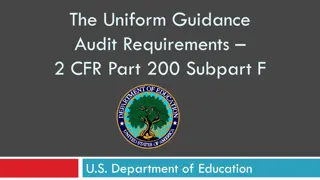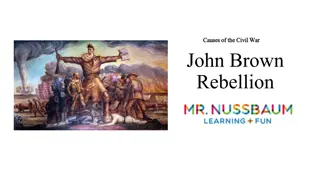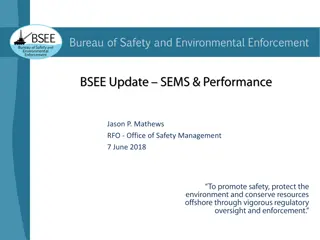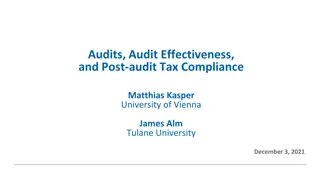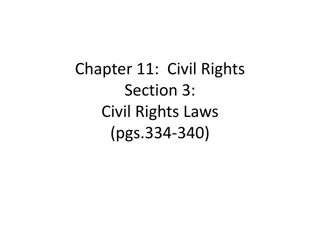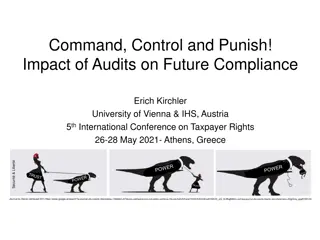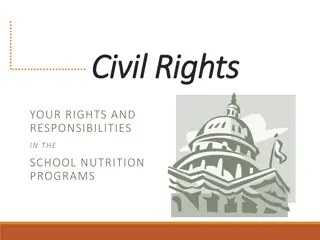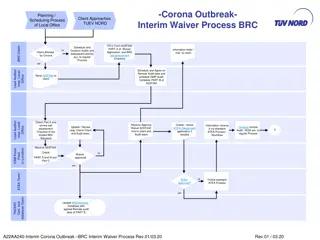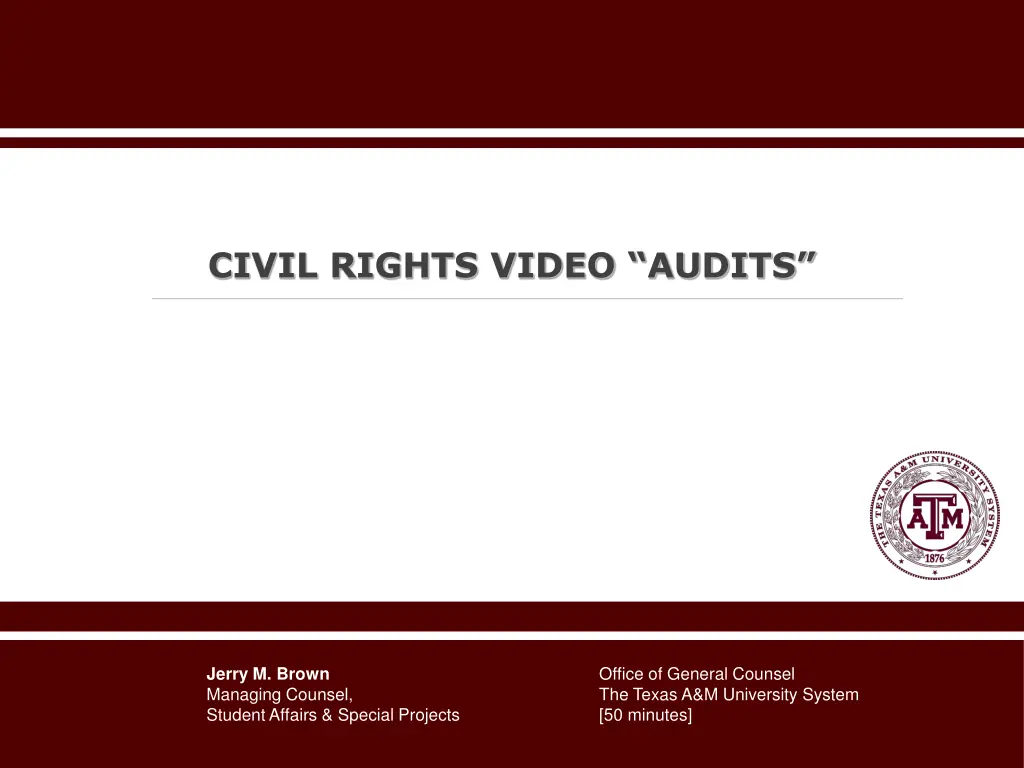
Insights from Civil Rights Video Audits at Texas A&M University System
Gain valuable insights on civil rights issues through video audits conducted by the Office of General Counsel at The Texas A&M University System. Explore the challenges activists face when filming government offices, the legal implications, and the importance of understanding expressive conduct. Learn about agent provocateurs and the boundaries of citizens' rights in government spaces.
Download Presentation

Please find below an Image/Link to download the presentation.
The content on the website is provided AS IS for your information and personal use only. It may not be sold, licensed, or shared on other websites without obtaining consent from the author. If you encounter any issues during the download, it is possible that the publisher has removed the file from their server.
You are allowed to download the files provided on this website for personal or commercial use, subject to the condition that they are used lawfully. All files are the property of their respective owners.
The content on the website is provided AS IS for your information and personal use only. It may not be sold, licensed, or shared on other websites without obtaining consent from the author.
E N D
Presentation Transcript
CIVIL RIGHTS VIDEO AUDITS Office of General Counsel The Texas A&M University System [50 minutes] Jerry M. Brown Managing Counsel, Student Affairs & Special Projects
December 2020 CR Audits 2
Agenda A. The Problem B. Why this is an Important Issue C. The Four Forums D. County Office Forums Identified E. Criminal Trespass F. Advice to Avoid Litigation December 2020 CR Audits 3
A. The Problem Activists enter county or state offices with video cameras just to see what reaction they get. If challenged they assert their 1Amd right to come on public property because they are citizens and governmental employees work for them. They also assert they do not have to identify themselves under Texas Penal Code 38.02, Failure to Identify. December 2020 CR Audits 4
Examples Denton, Denton County, TX Admin. Bldg. November 5, 2018 (16:49) https://www.youtube.com/watch?v=WNLrfcQL 0eo Ozona, Crockett County, TX August 24, 2020 (27:03) https://www.youtube.com/watch?v=RyfIBWEi M5k&feature=youtu.be December 2020 CR Audits 5
Is an audit speech? The test for expressive conduct is: (1) Does the activity intend to convey a particularized message?; and (2) Is there a great likelihood the message will be understood by those who view it? Texas v. Johnson, 491 US 397 (1989). December 2020 CR Audits 6
Agent Provocateur A person who acts intentionally to entice another person [government employee] to commit an illegal act, with the goal of creating a cause of action by the provocateur against the government employee or his employer. The cause of action could be criminal (employee) or civil (employee/employer). Tyranny Oppressive power; especially oppressive power exerted by the government. December 2020 CR Audits 7
Question? Do citizens have the right to enter a government office and film employees under the guise of engaging in expressive activity protected by the 1Amd because it is public property and governmental employees work for them? ANSWER: No, because government offices are not public forums, they are nonpublic forums (unless intentionally opened by the government for expressive activity). December 2020 CR Audits 8
A. Why this is an Important Issue Gibson Bros. v. Oberlin College $44M verdict in state court in June 2019 $11M actual, $33M punitive, $6.5M fees Judgment against college and the Dean of Students (personally liable) Barnes v. Zaccari 8 years of litigation (5/7/2007-7/23/2015) $50,000 judgment against president (personally liable) $900,000 settlement in July 2015 Violated 1Amd rights December 2020 CR Audits 9
Official Immunity Official immunity gives government officials breathing room to make reasonable but mistaken judgments about open legal questions; it protects government employees from personal liability. Plaintiff must prove a violation of clearly established law for employee to lose their official immunity. Clearly established means the law clearly and unambiguously prohibited the conduct that every reasonable official in the same position would understand that what s/he is doing violates the law. Wyatt v. Fletcher, 718 F3d 496 (5th Cir. [Tex.] 2013). December 2020 CR Audits 10
B. The Four Forums The existence of a right of access to public property and the standard by which speech limitations must be evaluated differ depending on the character of the property (forum) at issue. Perry Educ. Ass'n v. Perry Local Educators' Ass'n, 460 U.S. 37, 44 (1983). December 2020 CR Audits 11
Public property is classified into one of four (4) types of forums; the ability to limit speech is dictated by the type of forum: Traditional Public (strict scrutiny) Designated Pubic (strict scrutiny) Limited Public (reasonableness + rules) Non-public (reasonableness) Roberts v. Haragan, 346 F. Supp. 2d 853 (N.D. Tex. 2004). December 2020 CR Audits 12
Traditional public. A place which has always been held in trust for the use of the public, and has been used for purposes of assembly, communicating thoughts between citizens, and discussing public questions. Examples include public streets, sidewalks, and parks. Standard = strict scrutiny. December 2020 CR Audits 13
Designated public. Created by the government by intentionally opening a place or channel of communication not traditionally considered a public forum for use by the public at large for assembly and speech. Examples include designated areas such as gazebos, green space, mall or plaza areas. Standard = strict scrutiny. December 2020 CR Audits 14
Limited public. Forums opened for public expression limited to particular groups or to particular topics. Examples include community centers, meeting rooms available to citizen groups, athletic venues during sporting events. Standard = reasonableness + rules. December 2020 CR Audits 15
Nonpublic. State clearly did not intend to create a public forum, or where the nature of the property at issue is so inconsistent with the expressive activity that it is presumed the government did not intend to create a public forum. Examples include offices, mailboxes, internal email systems, law enforcement and military facilities. Standard reasonableness. December 2020 CR Audits 16
Important SCOTUS Forum Opinions Perry Education Association v. Perry Local Educators' Association, 460 U.S. 37 (1983). Cornelius v. NAACP Legal Defense and Educational Fund, 473 U.S. 788 (1985). International Society for Krishna Consciousness, Inc. v. Lee (Lee I), 505 U.S. 672 (1992). December 2020 CR Audits 17
Perry All government property that is not by tradition or designation a forum for public communication is by default considered to be a nonpublic forum. HELD: Mailboxes in public schools are not public forums. December 2020 CR Audits 18
Cornelius The Constitution does not guarantee that those who want to propagandize their views may do so wherever and however they please. The Constitution does not require the government to freely permit access to all its property to those who wish to exercise their rights of free speech. December 2020 CR Audits 19
Cornelius First Amendment does not forbid viewpoint-neutral exclusion of speakers who would disrupt nonpublic forum and hinder its effectiveness for its intended purpose. HELD: A charity campaign aimed at federal employees is a nonpublic forum and the government can limit participation in the program. December 2020 CR Audits 20
Lee I The government like other property owners has the power to preserve the property under its control for the use to which it is lawfully dedicated. The government does not create a public forum by inaction. A public forum is not created when members of the public are permitted freely to visit a place operated by the Government. December 2020 CR Audits 21
Lee I Public forums are those locations that have immemorially been held in trust for the use of the public and, time out of mind, have been used for purposes of assembly, communicating thoughts between citizens, and discussing public questions. HELD: Airport terminals are nonpublic forums. December 2020 CR Audits 22
Federal Appeals Courts Opinions Estiverne v. La. State Bar Ass'n, 863 F.2d 371, 376 (5th Cir. [La.] 1989)(state bar journal). Make The Rd. by Walking, Inc. v. Turner, 378 F.3d 133 (2d Cir. [N.Y.] 2004)(welfare office). December 2020 CR Audits 23
Estiverne A forum may be considered non-public (1) where there is clear evidence that the state did not intend to create a public forum; or (2) where the nature of the property at issue is inconsistent with the expressive activity, indicating the government did not intend to create a public forum. HELD: State Bar Journals are not public forums. December 2020 CR Audits 24
Make the Road The First Amendment does not guarantee the right to communicate one s views at all times and places or in any manner that may be desired. With the exception of traditional public fora, the government retains the choice of whether to designate its property as a forum for specified classes of speakers. December 2020 CR Audits 25
Make the Road Advocacy organization sued New York City alleging that it violated organization s free speech rights by excluding it from welfare office waiting rooms, where it sought to provide claimants with information and assistance. HELD: Welfare office waiting rooms are nonpublic forums. December 2020 CR Audits 26
Texas Opinion Reed v. State, 762 S.W.2d 640, 644 (Tex. App. Texarkana 1988, pet. ref'd)(high school campus). December 2020 CR Audits 27
Reed To create a public forum (traditional or designated or limited) there must be evidence that government authorities opened the place for public expressive activity. A limited public forum cannot be created by inaction, or by permitting limited discourse, but only by intentionally opening a nontraditional forum for public discourse. An area is not converted into a limited public forum simply because members of the public are permitted to come and go at will. HELD: Public high school sidewalk is not a traditional or designated public forum. December 2020 CR Audits 28
Synthesis of Opinions Except for traditional public forums, the default classification for government property is a nonpublic forum. To create a public forum (designated or limited) there must be evidence that government authorities opened the place for public expressive activity. A limited public forum cannot be created by inaction or by allowing members of the public to freely visit a place operated by the government, it can only be created by intentionally opening a location for public discourse. December 2020 CR Audits 29
D. County Office Forums Identified December 2020 CR Audits 30
E. Criminal Trespass Elements: (1) a person, (2) without effective consent, (3) enters or remains on the property or in a building of another, (4) knowingly, intentionally, or recklessly, (5) when s/he had notice that entry was forbidden orreceived notice to depart and failed to do so. Penal Code 30.05, Criminal Trespass December 2020 CR Audits 31
Bader v. State In cases involving public property, the State satisfies the of another element of the criminal- trespass statute by proving beyond a reasonable doubt that the complainant [property owner] has a greater right of possession of the property than does the accused [member of general public]. The public has a limited right of access to the UT campus. UPD officers have a greater right of possession of the university campus than did the accused. December 2020 CR Audits 32
15 S.W.3d 599, 602 (Tex. App.Austin 2000, pet. ref'd) State university campus is generally a nonpublic forum1, and thus the university may restrict access so long as the regulations are reasonable and do not attempt to suppress expression because of opposition to a speaker s views. [1NOTE: SB 18 altered this rule.] Texas trespass statute may be constitutionally applied, even to those who trespass in order to communicate, so long as it is applied without discrimination and is not used for the primary purpose of suppressing speech. HELD: Governmental unit can limit access to its property, even open areas, so long as the limitations are reasonable. December 2020 CR Audits 33
Penal Code 38.02, Failure to Identify (2003) A person commits an offense if he intentionally refuses to give his name, residence address, or date of birth to a peace officer who has lawfully arrested the person (probable cause) and requested the information. What is not an offense is refusing to provide your name, date of birth, or residence address when you are just lawfully detained under the reasonable suspicion standard. (Dutton 2008 WL 3166324) December 2020 CR Audits 34
F. Advice to Avoid Litigation WHAT THEY WANT Confrontation Attention Conflict Relevance Waste Your Time Chaos YouTube Post WHAT YOU GIVE THEM Indifference Inattention Accord Irrelevance Waste Their Time Order Diddly-Squat December 2020 CR Audits 35
You Can Post a Sign (but I would not) THE US SUPREME COURT HAS HELD THAT GOVERNMENT PROPERTY CAN BE IDENTIFIED AS ONE OF FOUR FORUMS FOR PURPOSES OF EXPRESSIVE ACTIVITY THIS OFFICE IS A NONPUBLIC FORUM. YOU DO NOT HAVE A FIRST AMENDMENT RIGHT TO ENGAGE IN EXPRESSIVE ACTIVITY IN THIS OFFICE. NO FILMING IS PERMITTED IN THIS OFFICE WITHOUT WRITTEN PERMISSION FROM ______. December 2020 CR Audits 36
Contact Information Jerry M. Brown https://www.tamus.edu/legal/ 979.458.6126 or jmbrown@tamus.edu December 2020 CR Audits 37


